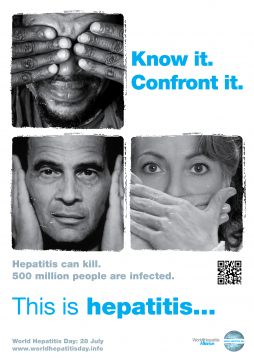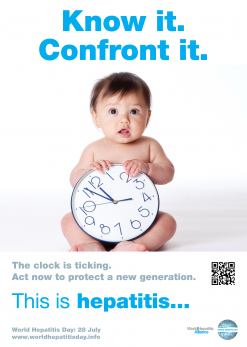 Viral hepatitis kills 1.5 million people worldwide each year. That’s as many people as HIV/AIDS. Although hepatitis is not as common in Northern Ireland, it is very common in other parts of the world, with an estimated 400 million people living with chronic hepatitis B and C worldwide.
Viral hepatitis kills 1.5 million people worldwide each year. That’s as many people as HIV/AIDS. Although hepatitis is not as common in Northern Ireland, it is very common in other parts of the world, with an estimated 400 million people living with chronic hepatitis B and C worldwide.
Both viruses are spread by contact with blood or bodily fluids of an infected person. Hepatitis B tends to be contracted from unprotected sex without a condom, mother to baby or from contact with infected blood in areas of the world where hepatitis B is more common. Hepatitis C is more commonly associated with sharing needles and/or sharing equipment for injecting drugs. It can also be spread by having had a tattoo or body piercing using non-sterile equipment.
In recent years there has been an increase in people injecting image or performance enhancing drugs like steroids or tanning products. Figures published for England in 2023 show that people using these drugs can also be infected with hepatitis B and C and are sometimes sharing injecting equipment with other people, which increases the risk of passing on these infections.
The Hepatitis B and C MC Network would encourage people to come forward for testing for hepatitis B and C if they have ever injected recreational or image and performance enhancing drugs, even if this was only once or some time ago. Testing is also recommended if you were born or had a blood transfusion in a higher risk country, which include Eastern Europe, many parts of Asia, Africa and South America.
It is also important to know about how to avoid becoming infected. This includes practising safer sex, avoiding getting tattoos abroad and not sharing needles or injecting equipment. Injecting equipment can be obtained from various needle exchange sites across Northern Ireland to reduce the risk from these infections.
A hepatitis B vaccine is available and routine immunisation of at-risk groups is recommended. A vaccine for hepatitis C is not available; however the treatment for hepatitis C is very effective and will cure the virus in 95-97 % of individuals treated. Successful Hepatitis C treatment does however not offer any immunity to becoming infected again.
What is Hepatitis B
- Hepatitis B public information leaflets

- What is hepatitis B
- How can you get hepatitis B
- How is hepatitis B diagnosed
- What is the treatment for hepatitis B
- How do I prevent passing hepatitis B onto others
- Hepatitis B vaccination information
- Hepatitis B testing video
What is Hepatitis C
- Hepatitis C public information leaflets
- What is Hepatitis C ?
- How can you get Hepatitis C ?
- How is Hepatitis C diagnosed ?
- What is the treatment for Hepatitis C ?
- How can I prevent passing hepatitis C onto others ?
- Hepatitis C testing video
Skipton Fund
The Caxton Foundation
Health and Social Care in Northern Ireland
Information booklet on Health and Social care for those living in Northern ireland. This booklet will tell you what you need to know about health and social care in Northern Ireland and how to access services - available in several languages.
